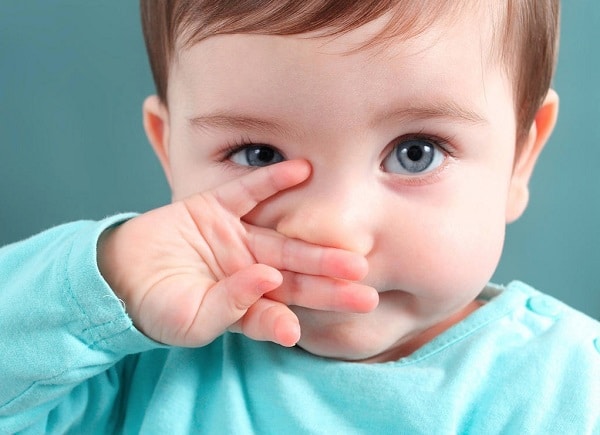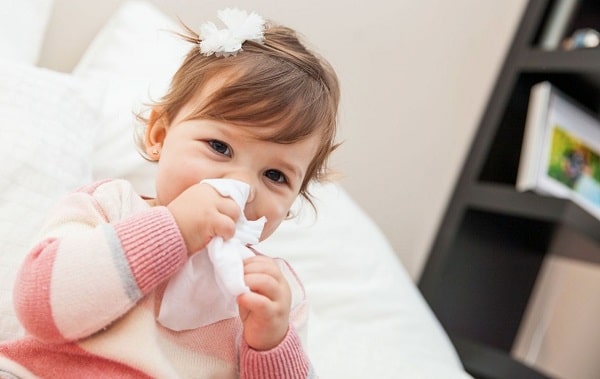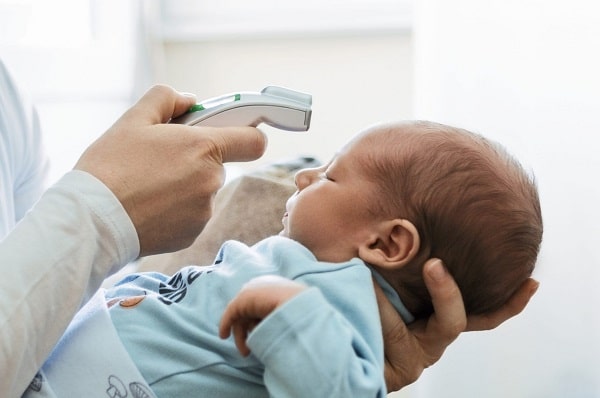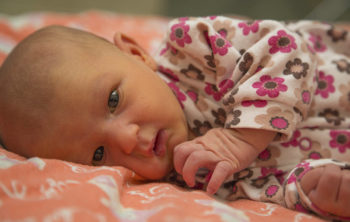Most parents know that a common cold in babies can be serious, but may not know how to identify the symptoms or how to treat it. In this blog post, we will discuss the causes of a common cold in babies, its symptoms and how to go about treating it. We hope this information will help you keep your little one healthy and comfortable during this time.
In the United States, it is estimated that there are between 5.5 and 22 million cases of colds each year in children younger than 5 years old. It is the most common illness suffered by babies and young children. While colds are generally harmless and go away on their own within a week or two, they can be quite uncomfortable for your little one.
Contents
What is the common cold in babies?
The common cold is a viral infection of your baby’s nose and throat. The main signs of a cold are nasal congestion and a runny nose.
Babies are especially likely to get the common cold, in part because they’re often around older children. Also, they have not yet developed immunity to many common infections. Within the first year of life, most babies have six to eight colds. They may have even more if they’re in child care centers.
Treatment for the common cold in babies involves easing their symptoms, such as by providing fluids, keeping the air moist and helping them keep their nasal passages clear. You can also try using a humidifier in your baby’s room. If your baby has a fever, you can give them acetaminophen or ibuprofen to help ease their discomfort.
Most babies recover from the common cold within a week or two. However, if your baby is younger than 3 months old, or if they have any other health problems, be sure to call your doctor if they develop symptoms of a cold.
What are the symptoms of the common cold in babies?
In addition to nasal congestion and a runny nose, other symptoms of a cold may include:
- Coughing
- Sneezing
- Fever (although not all babies with a cold will have a fever)
- Sore throat
- Irritability or fussiness
- Loss of appetite
- Trouble sleeping
If your baby has any of these symptoms, it’s likely that they have a cold. However, it’s always a good idea to call your doctor if you’re not sure, or if your baby is younger than 3 months old and has any cold symptoms.
When should I call the doctor?
If your baby is younger than 3 months old, or if they have any other health problems, be sure to call your doctor if they develop symptoms of a cold. Also, call the doctor if your baby’s cold symptoms seem to be getting worse, or if they last for more than 10 days. Finally, seek medical attention right away if your baby has any of these serious symptoms:
- Difficulty breathing
- Wheezing
- Rapid breathing
- Chest pain
- A high fever (above 102 degrees Fahrenheit)
These could be signs of a more serious condition, such as pneumonia, and will need to be treated by a doctor.
If your baby is 3 months old or older and has a cold, you should call the doctor if:
- Your baby isn’t wetting as many diapers as usual
- Your baby has a temperature higher than 100.4 F (38 C)
- Your baby seems to have ear pain or is unusually irritable
- Your baby has red eyes or develops yellow or greenish eye discharge
- Your baby has trouble breathing or wheezing
- Your baby has a persistent cough
- Your baby has thick, green nasal discharge for several days
- Your baby has other signs or symptoms that worry you, such as an unusual or alarming cry or not waking up to eat. If you are concerned about your baby’s cold, it is always best to call the doctor.
If your baby has any of the following symptoms, it is important to seek medical help immediately:
- Refusing to nurse or drink fluids
- Coughing hard enough to cause vomiting or changes in skin color
- Coughing up blood-tinged mucus
- Difficulty breathing or blue lips
- Extremely low energy or sleepiness.
If you are unsure whether your baby’s symptoms are serious, it is always best to err on the side of caution and call the doctor. Better to be safe than sorry!
What are the causes of the common cold in babies?
There are more than 200 viruses that can cause the common cold, but rhinoviruses are the most common. A cold virus enters your baby’s body through his or her mouth, eyes or nose. Once infected by a virus, your baby generally becomes immune to that virus. But because so many viruses cause colds, your baby may have several colds a year and many throughout his or her lifetime. Also, some viruses don’t produce lasting immunity.
Most colds go away on their own within a week or two, but they can be unpleasant for your little one. Symptoms of a cold may include a runny or stuffy nose, sneezing, cough, sore throat and fever. If your baby is younger than 3 months old and has a fever, be sure to call the doctor right away.
There are three primary ways that viruses can spread from one person to another: through the air, via direct contact, or by touching contaminated surfaces.
- Air: When someone who is sick coughs, sneezes or talks, they may directly spread the virus to your baby.
- Direct contact: Additionally, if somebody with a cold touches your baby’s hand, the cold virus can be transferred and your baby may become infected after touching their eyes, nose or mouth.
- Contaminated surfaces: Finally, some viruses can live on surfaces for extended periods of time. Your baby may catch a virus by coming into contact with a contaminated surface, such as a toy.
It’s important to take steps to protect your baby from becoming sick. Wash your hands frequently and thoroughly, especially before handling your baby. Avoid close contact with people who are sick. Keep your baby’s environment clean and disinfected. And, finally, make sure your baby is up-to-date on all of his or her vaccinations. By taking these precautions, you can help keep your little one healthy and safe from harmful viruses.
How is the diagnosis of common cold in babies?
If your baby is younger than 3 months old and has a cold, it’s important to call the doctor early in the illness. This is because newborns are more susceptible to serious illnesses, and a cold could be a sign of something more serious. The doctor can diagnose a cold by your baby’s signs and symptoms.
If the doctor suspects your baby has a bacterial infection or other condition, he or she may order tests. Older babies generally don’t need to see the doctor for a common cold, but if you have questions or if your baby’s symptoms worsen or don’t go away, it might be time to make an appointment.
What is the treatment for the common cold in babies?
There is no cure for the common cold, but there are ways to help relieve your baby’s symptoms. For example, you can use a humidifier in their room to help loosen congestion. You can also elevate their head when they sleep by placing a pillow under their mattress.
If your baby is having trouble breathing, contact your doctor right away. They may prescribe a nebulizer treatment, which involves using a machine to turn liquid medication into a fine mist that your baby can inhale. This can help reduce swelling in the airways and make it easier for your baby to breathe.
In most cases, the common cold will run its course within a week or two and your baby will start to feel better. However, if your baby’s symptoms are severe or they seem to be getting worse, contact your doctor right away.
Fever-reducing medications:
If your child has a fever, you may be considering giving them over-the-counter (OTC) medications to help reduce it. However, it’s important to know that these medications will not kill the cold virus. Fever is a part of your child’s natural response to the virus, so it may actually be helpful to allow your child to have a low-grade fever.
For treatment of fever or pain in children, consider giving your child infants’ or children’s over-the-counter fever and pain medications such as acetaminophen (Tylenol, others) or ibuprofen (Advil, Motrin, others). These are safer alternatives to aspirin. If you have any questions about which medication is right for your child, be sure to speak with your pediatrician.
Children younger than 3 months old shouldn’t be given acetaminophen, and ibuprofen shouldn’t be given to children younger than 6 months old. Children and teenagers recovering from chickenpox or flu-like symptoms should never take aspirin. Aspirin has been linked to Reye’s syndrome, a rare but serious condition. If you’re giving your child a pain reliever, make sure to follow the dosing guidelines carefully. Call your doctor if you have any questions about the right dosage for your baby.
Cough and cold medications:
Coughing and colds are common in infants and young children. However, over-the-counter (OTC) cough and cold medications are not safe for them. These medicines can have potentially serious side effects, including fatal overdoses in children younger than 2 years old.
Fever reducers and pain relievers may be used to treat coughing and colds in children younger than 6 years old, but only under the supervision of a healthcare provider. Avoid using OTC cough and cold medications for children younger than 12 years old. If your child has a cough or cold, contact their healthcare provider for treatment options.
What are risk factors?
Babies are at an increased risk of developing a cold due to several factors.
- Immature immune systems: their immune systems are still immature, meaning they haven’t yet been exposed to or developed resistance to most of the viruses that cause colds.
- Exposure to other children: spending time with other children exposes them to more potential cold-causing viruses.
- Time of year: colds are more common during certain times of the year, although babies can get a cold at any time.
By be aware of these risks and taking some simple precautions, you can help reduce your baby’s chances of getting a cold.
What are the complications of common cold in babies?
These conditions can occur along with a common cold:
- Acute ear infection (otitis media): Ear infections occur when bacteria or viruses enter the space behind the eardrum. They are the most common complication of the common cold, and can cause serious pain and discomfort. If your child has an ear infection, you should take them to see a doctor as soon as possible.
- Wheezing: A cold can trigger wheezing, even if your child doesn’t have asthma. If your child does have asthma, a cold can make it worse. If you notice your child wheezing, it’s important to seek medical attention right away.
- Acute sinusitis: A common cold that doesn’t resolve may lead to an infection within the sinuses (sinusitis). Sinus infections can be very painful, and may require antibiotics to clear.
- Other infections: A common cold can lead to other infections, including pneumonia, bronchiolitis and croup. Such infections need to be treated by a doctor. If your child is showing signs of any of these complications, it’s important to seek medical help right away.
How is the prevention of common cold in babies?
There are several things that parents can do to help prevent their babies from getting the common cold. Some simple measures include:
- Washing your hands thoroughly and often, especially before handling your baby
- Avoiding close contact with people who are sick
- Keeping your baby away from crowded places
- Keeping your baby’s environment clean and free ofdust and other irritants
- Encouraging your baby to breastfeed, as breastmilk provides antibodies that can help protect against infection
If you think your baby may have a cold, it is important to seek medical advice as soon as possible. Babies are more susceptible to complications from infections than adults, so it is always best to err on the side of caution. Treatment for a cold in a baby will usually focus on relieving symptoms and supporting the immune system. In some cases, anti-viral medication may be prescribed. Prevention is always the best approach when it comes to protecting your baby from illness.
What are some viruses can lead to more serious illnesses?
The common cold is one of the most common illnesses in babies. It is caused by a virus, which can be spread through the air, direct contact or contaminated surfaces.
Most viruses that cause colds are relatively harmless and will go away on their own within a week or two. However, some viruses can lead to more serious illnesses, such as pneumonia or bronchiolitis. Therefore, it is important to be aware of the symptoms of the common cold and to seek medical help if your baby appears to be struggling to breathe.
There are many different types of viruses that can cause colds in babies. Some of the most common include:
- Rhinoviruses: These are the most common type of virus that causes colds. They are typically spread through the air, for example, when an infected person coughs or sneezes.
- Respiratory syncytial virus (RSV): This virus is a common cause of colds in babies, but it can also lead to more serious illnesses, such as pneumonia. It is typically spread through direct contact, for example, when someone with the virus touches a baby’s hand and then the baby touches his or her eyes, nose or mouth.
- Coronaviruses: These viruses are typically spread through direct contact or contaminated surfaces. They can cause colds, but they can also lead to more serious illnesses, such as pneumonia.
- Human metapneumovirus: This virus is typically spread through the air. It can cause colds, but it can also lead to more serious illnesses, such as pneumonia.
- Adenoviruses: These viruses are typically spread through direct contact or contaminated surfaces. They can cause colds, but they can also lead to more serious illnesses, such as bronchiolitis.
Some tips on how to help your baby cope with a cold:
Here are some tips on how to help your baby cope with a cold are given.
- A humidifier: Using a humidifier can help add moisture to the air and reduce congestion.
- Saline nasal drops: Saline nasal drops can help thin out mucus and make it easier for your baby to breathe.
- Elevating your baby’s head: When your baby is lying down, elevate his or her head with a pillow to help ease congestion.
- Extra cuddles and TLC: Sometimes the best thing you can do for a sick baby is to offer lots of extra cuddles and love. This can help them feel better and ease their symptoms.
- Keep your baby’s head and chest warm: When your baby has a cold, it is important to keep their head and chest warm. This will help them to feel more comfortable and will also help to prevent further respiratory infections. A simple way to do this is to dress your baby in layers, with a hat or scarf if necessary.
- Make sure your baby gets plenty of rest: It is very important that your baby gets plenty of rest when they are ill. This will help their body to recover and will also help to prevent further illness. Try to create a calm environment for your baby to sleep in and make sure they have a comfortable place to rest.
- Keep your baby hydrated: It is important to keep your baby hydrated when they have a cold. This can be done by offering them small sips of water or breast milk frequently. You can also give them oral rehydration solutions if they are dehydrated.
- Clear your baby’s nose: It is important to help your baby breathe easily when they have a cold. One way to do this is to use a suction bulb to clear their nose of mucus. You can also use a saline nose spray to help loosen the mucus.
- Give your baby time to recover: It is important to remember that colds can take up to two weeks to resolve completely. During this time, it is important to provide your baby with plenty of love and support.
If you are concerned about your baby’s cold, or if they are not improving after a few days, it is important to speak to a healthcare professional.
Conclusion:
A common cold in babies can be serious, so it is important to know the symptoms and how to treat it. If you are concerned that your child may have a cold, please consult with your pediatrician. We hope this information will help you keep your little one healthy and comfortable during this time.
Read more: Jaundice (Icterus) in Babies and Adults: Causes, Symptoms and Treatment




